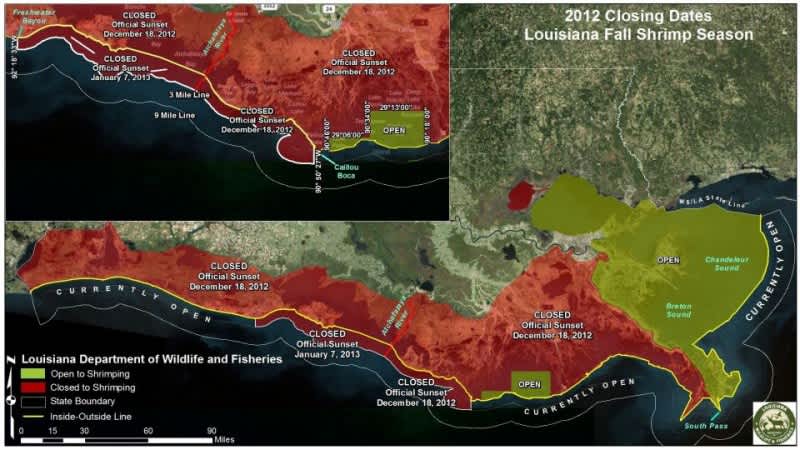Fall Shrimp Season to Close in Large Portion of Inshore Waters

Louisiana Department of Wildlife and Fisheries Secretary Robert Barham announced today that the fall shrimp season will close in a majority of state inside waters on Tuesday, December 18, at sunset except for inside waters located east of the Mississippi River and in a portion of the Terrebonne Basin.
Shrimping will remain open in the following areas of inshore waters ONLY:
- State inside waters east of the Mississippi River from the Mississippi/Louisiana state line southward to the eastern shore of South Pass of the Mississippi River
- The portion of state inside waters within the Terrebonne Basin south of 29 degrees 13 minutes 00 seconds north latitude from 90 degrees 18 minutes 00 seconds west longitude westward to 90 degrees 34 minutes 00 seconds west longitude, and those inside waters south of 29 degrees 06 minutes 00 seconds north latitude from 90 degrees 34 minutes 00 seconds west longitude westward to 90 degrees 46 minutes 00 seconds west longitude
Shrimping will remain open in the following areas of outside waters ONLY:
- The portion of state outside waters, south of the Inside/Outside Shrimp Line as described in LA R.S. 56:495 seaward a distance of three nautical miles, from the Atchafalaya River Ship Channel at Eugene Island as delineated by the Channel red buoy line westward to the western shore of Freshwater Bayou Canal at 92 degrees 18 minutes 33 seconds west longitude which will close to shrimping on Monday, January 7, 2013 at sunset.
- All state outside waters east of the northwest shore of Caillou Boca as well as state outside waters west of Freshwater Bayou Canal and fishery jurisdiction waters claimed by the state beyond the three nautical mile closure zone
This closure date coincides with the December 18 closure of a portion of state outside waters approved earlier this month by the Louisiana Wildlife and Fisheries Commission. These closures historically take place at this time of year when the temporary exemption from the white shrimp minimum possession size of 100 count per pound expires.
Current sampling conducted by the Department indicates that average white shrimp size in the areas to be closed is smaller than 100 count per pound. This action protects these small white shrimp and provides increased opportunity for growth to larger, more valuable sizes.
Shrimp are the state’s most valuable fishery, and Louisiana continues to lead all states in shrimp landings. In 2011, approximately 5,900 licensed Louisiana commercial shrimpers landed 92 million pounds of shrimp (all species combined/heads-on weight) that had a dockside value of $130 million.
The Department of Wildlife and Fisheries is charged with managing and protecting Louisiana’s abundant natural resources. For more information, visit us at www.wlf.louisiana.gov on Facebook at www.facebook.com/ldwffb or follow us on Twitter @LDWF.

